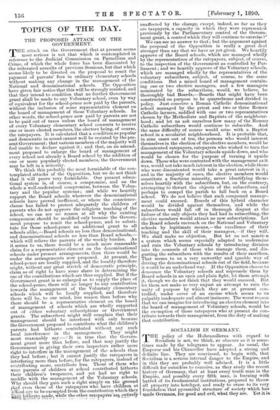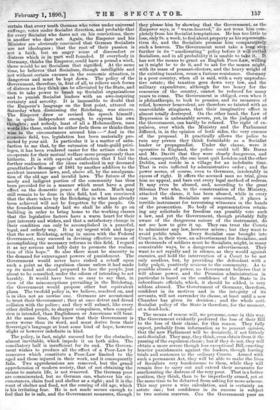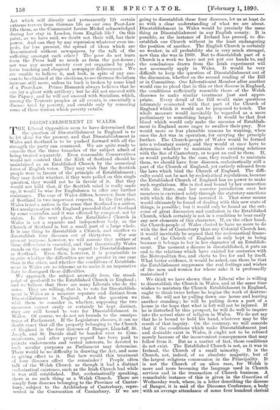SOCIALISM IN GERMANY. • T HE policy of the Hohenzollerns with regard to
Socialism is not, we think, so obscure as it is some- times made by the telegrams to appear. As usual, the Emperor and his Chancellor have adopted a strong and definite line. They are convinced, to begin with, that Socialism is a serious internal danger to the Empire, and in this they are probably well advised. It is a little difficult for outsiders to conceive, as they study the recent history of Germany, that at least every tenth man in the Empire, and possibly every fifth man, is burning with hatred of its fundamental institutions, prepared to throw all property into hotchpot, and ready to erase to its very foundation that pyramidal structure of society which has ILIftelc ciermaris, for good and evil, what they are. Yet it is certain that every tenth German who votes under universal suffrage, votes under Socialist direction, and probable-that for every Socialist who dares act on his convictions, there is another who dare not. Again, the Emperor and his Minister are obviously convinced that German Socialists are not ideologues ; that the root of their passion is not a faith, but an angry sense of discomfort or distress which is in part well founded. If everybody in Germany, thinks the Emperor, could have a pound a week, there would be no Socialism that signified. At the same time, he believes that Socialism, though intelligible and not without certain excuses in the economic situation, is dangerous and must be kept down. The policy of the Government, therefore, is, first of all, to relieve such forms of distress as they think can be alleviated by the State, and then to take power to break up Socialist organisations and to punish Socialist leaders with an awe-inspiring certainty and severity. It is impossible to doubt that the Emperor's language on the first point, uttered on Saturday when dismissing the Reichstag, was sincere. The Emperor - drew or revised the speech himself ; he is quite independent enough to express his own thoughts ; and nobody, least of all a Hohenzollern, uses words like these, unless he either feels them or thinks them wise in the circumstances around him :—" And in the economic field, too, legislation has been materially pro- moted by your aid. In particular it is a matter of satis- faction to me that, by the extension of trade-guild privi- leges, it has been rendered easier for the artisan class to co-operate for their mutual welfare more prosperously than hitherto. It is with especial satisfaction that I hail the further realisation of the ideas embodied in my deceased grandfather's Message of 1881 by another addition to the accident insurance laws, and, above all, by the amalgama- tion of the old1 age and invalid laws. The future of the needy and indigent portion of the community has thus been provided for in a manner which must have a good effect on the domestic peace of the nation. Much may still remain to be done in this field, but I am convinced that the share taken by the Reichstag in what has already been achieved will not be forgotten by the people. On the foundations already laid we shall be able to go on building in order to bring home to the working classes that the legislative factors have a warm heart for their just interests and wishes, and that a satisfactory change in their condition can only be accomplished in a peaceful, legal, and orderly way. It is my urgent wish and hope that the new Reichstag, acting in union with the Federal Government, may succeed in devising effective means of accomplishing the necessary reforms in this field. I regard it as my serious and lofty duty to promote the realisa- tion of this hope." So also there must be sincerity in the demand for extravagant powers of punishment. The Government would never have risked a rebuff upon such a point as the expulsion clause unless it had made up its mind and stood prepared to face the people, just about to ba consulted, under the odium of intending to act harshly. It would have been so easy to say that, in view of the misconceptions prevailing in the Reichstag, the Government would propose other but equivalent plans. The twofold policy is, we believe, resolved on, and is in idea not an unwise one. Germans are accustomed to trust their Government ; they at once detest and dread collision with the police • and they will submit, like every other drilled people, to ;harper compulsion, when compul- sion is intended, than Englishmen or Americans will bear. At the same time, they know that their Government is ne-ier worse than its word, and must derive from their Sovereign's language at least some kind of hope, however slight or however indefinite in kind.
The policy, in fact, might succeed but for the obstacles, almost inevitable, which impede it on both sides. The conciliatory half is insufficient for its end. The Govern- ment wishes to produce all the effect of a Poor-Law by measures which constitute a Poor-Law limited to the aged and those injured in their work, and it consequently fails. Two apprehensions are removed, but the grand apprehension of modern society, that of not obtaining the means to sustain life, is not removed. The German poor are commiserated, but no German can, whatever his cir- cumstances, claim food and shelter as a right ; and it is the want of shelter and food, not the coming of *old age, which is his irritating fear. He is not made secure enough to feel that he is safe, and the Government measures, though they please him by showing that the Government, as the Emperor says, is "warm-hearted," do not wean him com- pletely from his Socialist temptations. He has too little to lose, only 9s. a week, to feel about property as his representa- tives do, and the Socialists promise him comparatively such a heaven. The Government must take a long step further in its " ameliorating " policy before it will outbid Socialism, and in all probability it is unable to take it. It has not the means to grant an English Poor-Law, willing as it might be to do it, and to ask for the means might, with its mass of peasant-electors, and the heavy weight of the existing taxation, rouse a furious resistance. Germany is a poor country, when all is said, with a very unproduc- tive estate ; the taxation goes down very low, and the military expenditure, although far too heavy for the resources of the country, cannot be reduced for many years to come. The Government is obliged, even when it is philanthropic, to look to pennies, and its measures of relief, however benevolent, are therefore so tainted with an unavoidable stinginess, that their imaginative effect is almost totally destroyed. On the other hand, the Law of Repression is unbearably severe, yet, in the judgment of the Government, can hardly be relaxed. The right of ex- pulsion, over which the Ministry and the Parliament differed, is, in the opinion of both sides, the very essence of the proposal. It practically allows the police to ruin any, person they think formidable as a Socialist leader or propagandist. Under the clause, were it operative in England, the police could tell Mr. Burns and Mr. Davitt that they were clearly dangerous, and that, consequently, the one must quit London and the other Dublin, and reside in a village for an indefinite time. That is ruin inflicted by administrative order ; and the power seems, of course, even to Germans, intolerably in excess of right. It offers the accused man no trial, gives him no appeal, and bars out every legal method of redress. It may even be abused, and, according to the great Silesian Peer who, to the consternation of the Ministry, attacked the clause, it has been abused, while in every case in which Socialists are concerned, it places a terrible instrument for terrorising witnesses in the hands of the prosecution. No body of representatives retain- ing any solicitude for freedom can possibly vote such a law, and yet the Government, though probably fully aware of the dangerous nature of the instrument, do not see how to give it up. They can trust the Courts to administer any law, however severe ; but they want to avoid public trials. Every Socialist case brought into Court is, in their view, an advertisement for Socialism, and as thousands of soldiers must be Socialists, might, in many conceivable ways, be a dangerous advertisement. They want to act rapidly and in silence, as they would against enemies, and hold the intervention of a Court to be not only needless, but, by providing the defendant with a lofty pulpit, positively noxious to the community. As to possible abuses of power, no Government believes that it will abuse power, and the Prussian administration in particular is based on the confidence of the State in its subordinate officials, which, it should be added, is very seldom abused. The Government of Germany, therefore, confident in its motives and in the integrity of its servants, will not surrender its clause, at least until a new Chamber has given its decision ; and the whole anti- Socialist policy of the State is therefore, for the moment, at a dead-lock.
The means of rescue will, we presume, come in this way. The Government evidently preferred the loss of their Bill to the loss of their clause, for this reason. They fully expect, probably from information as to peasant opinion, that the new Parliament will be decisively, if not bitterly anti-Socialist. They may, they think, even obtain from it the passing of the expulsion clause ; but if they do not, they will obtain a more severe though less exceptional Bill, enacting heavier punishments against the leaders, though leaving trials and sentences to the ordinary Courts. Armed with such a permanent Act, they will be able to make the lives of Socialists very burdensome to them, while they will remain free to carry out and extend their measures for ameliorating the distress of the very poor. That is a better position, they think, than to be imperfectly armed, yet at the same time to be debarred from asking for more armour. This may prove a wise calculation, and is certainly an astute one ; but confidence in its success is subject to two serious reserves. Can the Government pass an Act which will directly and permanently lift certain extreme terrors from German life as our own Poor-Law lifts them, as the Communist Louise Michel acknowledged during her stay in London, from English life ? On this point, as we have said, we doubt not their will, but their power. And can they by any repression whatever even im- pede, far less prevent, the spread of ideas which are disseminated without newspapers, by the talk of the suffering amongst each other ? The poor do not learn from the Press half so much as from the pot-house; nor was any secret society ever yet organised by plat- form teaching and eloquent newspaper deliverances. We are unable to believe it., and look, in spite of any suc- cess to be obtained at the elections, to see German Socialism increase still more, unless its back is broken by some kind of a Poor-Law. Prince Bismarck always believes that he can lay a ghost with artillery ; but he did not succeed with the Papacy, and he will not succeed with Socialism, which, among the Teutonic peoples at all events, is essentially a disease bred by poverty, and curable only by removing some of those terrors which poverty entails.




































 Previous page
Previous page